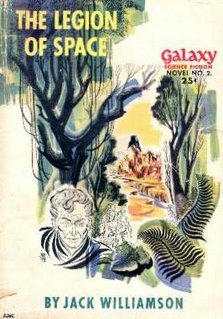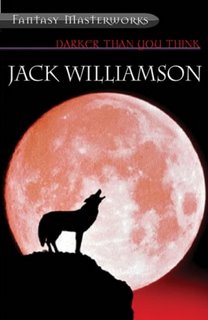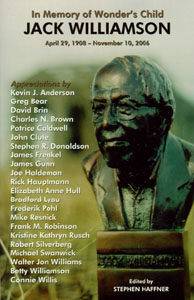Sense of wonder!That feeling that normally comes with youthful optimism. The probability that we will reach the stars. That humankind will master the universe, mortality, disease, war. Sense of wonder was the key ingredient in science fiction. Particularly early science fiction. Forget Roddenberry. Forget Lucas. Forget Galactica. One name signifies the sense of wonder more [...]
Sense of wonder!
That feeling that normally comes with youthful optimism. The probability that we will reach the stars. That humankind will master the universe, mortality, disease, war. Sense of wonder was the key ingredient in science fiction. Particularly early science fiction. Forget Roddenberry. Forget Lucas. Forget Galactica. One name signifies the sense of wonder more than any other. That name is…
Jack Williamson!
Forgive the exclamation points. I know they’re goofy, but I can’t help it. When it comes to Jack Williamson, I think in exclamation points.
I won’t bullshit you and make the claim that Jack Williamson was the greatest science fiction writer of all time. I’m sure that some hold that opinion, but I never thought that Williamson was the equal to Alfred Bester, Theodore Sturgeon, Arthur C. Clarke and a few others. Heinlein’s books often had the quote on them, “The Dean of Science Fiction Writers”, I don’t think that is or was ever the truth. Jack Williamson, whose writing career went from the late 1920’s to the mid 00’s, will always be the Dean to me.
Maybe not the best, but Jack Williamson always gave his readers their money’s worth. His work was consistantly entertaining, as well as rewarding. His novels and stories never failed to captivate me.
I’ll never forget the wonder, the awe, the thrill it was to read The Legion of Space when I was young. Originally printed in pulp magazines, The Legion of Space was published in book form in 1934. It, more than any other piece of writing that I am aware of, captured that wonder. It stirred my heart and I knew that if everyone would only slow down and read science fiction, all of the world’s troubles would end. I was a naive kid, sure, but that is the way I felt.

I mentioned George Lucas earlier. His massively overrated Star Wars movies effectively set science fiction back nearly half a century. Williamson had done it and so much better with The Legion of Space. I can’t say for sure, but I’d be damned surprised to learn that Lucas never read The Legion of Space and its sequels. It sure looks like he borrowed liberally from it.
Anyway, moving on…Jack Williamson was a trailblazer. He was one in the science fiction field and he was in his own life. He and his family traveled across Texas to New Mexico in a covered wagon. In the penniless Great Depression, he took boat trips to meet other science fiction enthusiasts. Jack was an early professional in the weather forecasting field. Jack was raised on a ranch/farm, and yet he gradually advanced his education, eventually getting a PHD.
And his fiction…well, it’s legendary. His stories charted unknown territories and he was the first writer of fiction to use the term ‘Genetic Engineering’. He coined the word, ‘Terraform’. You hear about cliches in SF…well Jack was one of the ones that invented them. He published a classic werewolf novel in 1948 called Darker Than You Think, but in typical Williamson fashion he used science to explain the lycanthropy, rather than folklore.

Jack Williamson, unlike far too many others, continued to evolve as the years went by. Changing his style and subject matter as the decades went on. He managed to come across as fresh and youthful, despite his advancing age.
If you read science fiction, fantasy, horror; or if you even watch it in movies or on TV, you have seen Jack Williamson’s influence. Whether you are aware of it or not.
Jack died on November 10th, 2006, at the age of 98. This was just one year after the publication of his final novel, The Stonehenge Gate. He had an astonishing career that is without parallel. Within or outside the science fiction genre.
Which brings me to Haffner Press. Haffner is a publisher that is bringing classic SF works back into print in deluxe editions. There have been some collections by Edmund Hamilton and Leigh Bracket, but Haffner appears to be specializing in reprinting Jack Williamson. There is an ambitious eight volume set of short stories in the process of being published. Sadly, I can’t afford to jump on that particular train. Haffner has also published a mammoth retrospective of Williamson’s work in honor of his 25th Anniversary as a published writer. I do own a copy of this one and it is a stunning book.
I mentioned that Jack Williamson died on November tenth of last year. His passing left a hole in the SF genre that can never be filled. It really was the end of an era.
Haffner recently released a chapbook called In Memory of Wonder’s Child: Jack Williamson. It’s a great little book that features Appreciations by SF luminaries like Frederik Pohl (who collaborated with Williamson on numerous occasions), John Clute, Stephen R. Donaldson, Greg Bear, Connie Willis, Joe Haldeman, Robert Silverberg and many others. These reminisces are touching and poignant and even while they are very sad, there is joy and celebration in most of them.

There is also a replication of the first piece of writing Jack Williamson sold. It is a nonfiction essay that appeared in Hugo Gernsbeck’s Amazing Stories Quarterly called Scientificion: Searchlight of Science. This piece clearly shows Jack’s infectious enthusiasm and optimism. I love this line, “Science is the doorway to the future; scientifiction, the golden key”. By the way, some early SF people liked the term, scientifiction. I always thought it was awkward and I’m glad that it never caught on.
There are two pieces of fiction in In Memory of Wonder’s Child. One is a very early effort called Nonstop to Mars. It’s a fun piece and I believe that I had read it years ago. The real selling point of this book is Jack’s very last short story. It’s called The Mists of Time and I wouldn’t have dreamed that it had been written by a man in his upper 90’s. The Mists of Time still features that awe and wonder that was always the showcase of Jack Williamson’s fiction.
This brief (108 pages) book also has a sample of Jack Williamson’s 50’s comic strip called Beyond Mars, some nice photos and an essay by Jack about Julius Schwartz and The Justice League of America.
Coming away from In Memory of Wonder’s Child, I feel that I’ve grown a bit closer to the man I never had the opportunity to actually meet: Jack Williamson. It’s an intimate view into a man’s life from those that loved him.
No comments